Guest Editorial
The Other Victims: Slaughterhouse Workers and Others Who Kill Animals
An Exploratory Essay by Rachel MacNair
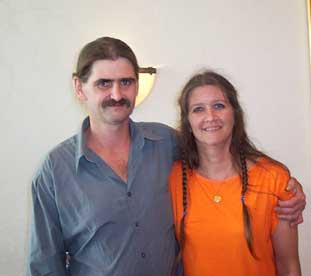
Virgil Butler, former Tyson employee, and his partner Laura Alexander
What is the effect of the act of killing on the human mind?
When I started out to study this topic, I knew "battle fatigue" was officially named Post-Traumatic Stress Disorder (PTSD). The diagnosis started with combat veterans, and then expanded to all kinds of victims. The notion that being an active participant in the violent situation can lead to PTSD is fairly new, even for combat veterans. I pulled together evidence using the U.S. government's own data on its veterans of its war in Vietnam. I found that those who said they had killed had more severe PTSD symptoms than the other veterans in the study, even when taking the intensity of battle into account. Those that had been directly involved in killing civilians or prisoners had more severe symptoms than those who only saw such things take place. I've also dug up some evidence that this applies to people who carry out executions, police who shoot in the line of duty, Nazis, criminal homicide, and a variety of other situations.
So what about the killing of animals? I did talk once to a fellow peace movement activist who had worked in a slaughterhouse, and he affirmed the traumatic symptoms I mentioned without wanting to give any more detail. A similar example is the account of Virgil Butler, the ex-chicken-slaughterer who, with the help of his partner Laura Alexander, became an animal activist (http://www.upc-online.org/fall04/virgil.htm.) Two cases are not enough to prove anything, but we do know the accident rate is higher than in other forms of factories. The speed of the disassembly line, the sharp knives used, and the struggles of the animals no doubt are major factors in accounting for this accident rate. But it is consistent with the idea that workers suffer PTSD symptoms such as emotional numbing and detachment from others. To really know, we'd need a study comparing trauma symptoms in slaughterhouse workers to workers in, say, a peach-canning factory, or something along those lines.
Furthermore, slaughterhouse workers tend to be poorly paid, to be drawn from among vulnerable immigrants who have little other employment choice, and to have an unusually high turnover rate. Theoretically, there could be changes to pay them more equitably, reduce the speed of the lines, and otherwise improve working conditions; but as long as the management is in a position to exploit vulnerable workers, such changes are unlikely. In any case, without a change in the essential nature of the work, the killing of animals, then what may be the most traumatic aspect cannot be removed.
Euthanizing of animals in shelters has been reported as a trauma for the staff. This was reported in Psychology Today: "Shelter workers who have to euthanize animals as a regular part of their jobs suffer a wide range of distressing reactions, including grief, anger, nightmares and depression, according to a study I conducted with a fellow social worker . . . .[comments include] ' I have a lot of sleepless nights, a lot of crying' . . . 'I've had breakdowns in the euthanasia room because I feel so helpless' . . ." (Psychology Today, Nov/Dec 1998, page 10). Of course, people selected this employment because of a love of animals, making such symptoms of distress more predictable.
In a report on 60 Minutes (air date January 11, 1998), a Spanish bullfighter said he dreams of bullfighting every night. That's a possible post-trauma symptom – dreams that repeat the trauma and are intrusive and unshakeable. The bullfighter identifies it as possibly a trauma by mentioning that tennis players don't have the same problem because they're not in danger of death. This does complicate perpetration with risk to one's own life, but the risk is chosen. This bullfighter raises bulls himself, and when asked if it made him sad to think of those bulls dying in the ring he said, "You know every -- each bull that I -- that I fight and kill him, he's a -- he's a part of you for the rest of your life. You understand that?" This suggests other intrusive symptoms to go along with the dreams.
It may seem odd to think of something people do more or less voluntarily as being traumatic to them, but Friends and indeed all peace activists to whom I have ever brought this up show that they immediately understand how it applies to combat veterans. There seems to be enough evidence that to some extent, this may apply to killing animals as well.
To some Friends and other well-intentioned persons, the knowledge of the harm it may do to slaughterhouse workers to kill animals could actually bring about a change of heart more effectively than knowledge of the harm done to the animals themselves This may be a path of study worth pursuing for spreading the message of what a nonviolent diet means.
For more information see:
www.rachelmacnair.com/pits
This web page gives a basic explanation, including all symptoms, and links to more details.
Book:
MacNair, Rachel. Perpetration-Induced Traumatic Stress: The Psychological Consequences of Killing . Westport, CT: Praeger, (Available from Barnes & Noble for reduced price.)
Gems
Violence is a method whereby the ruthless few can subdue the passive many. Nonviolence is a means by which the active many can overcome the ruthless few.
--Jonathan Schell, The Unconquerable World
For even saintly folk will act like sinners
Unless they have their customary dinners.
--Bertolt Brecht, The Threepenny Opera
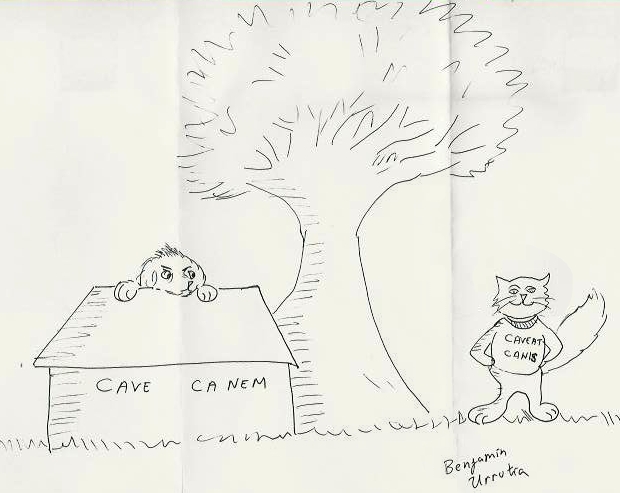
With apologies to the Latin-literate--Cave Canem: Beware the Dog. Caveat Canis: Let the Dog Beware.
Letter
Dear Friends,
Thanks very much for sending issues 18, 45, and 50 of The Friendly Vegetarian [during the summer of 1994 mail sent to me was returned to sender]; that's like a walk down Memory Lane with old friends. I corresponded with Barry Zalph until he passed away, then with Roshan Dinshah, who was also a prison chaplain in New Jersey. . . . . The Friendly Vegetarian (FV) was a great publication, and The Peaceable Table's mission to resume witness is noble indeed.
FV and correspondence with Barry and Roshan were helpful in an era when Florida prisoners had no consistent vegan options. When, at Avon Park Correctional Institute, the (ex-)chaplain told me to eat meat or starve, that led to litigation which successfully established vegan options for all Florida prisoners. However, that option has since been unconstitutionally eroded . . . another round of litigation has been ripening ever since. . . .
Late last night I was happy to receive the June-July issue of PT. Thank you very much for sending it. I value George Fox's expression of his experience of paradise, and your editorial. "The kingdom of God is within you," Jesus says, and I always like reading and hearing of personal visions of that truth . . . . I appreciate your expressions of it, as well as this entire issue of the beautiful PT.
--Gerald Niles 122280
A1108L
Graceville Correctional Inst.
5168 Ezell Road, Graceville, FL 32440
Gerald Niles welcomes correspondence with readers of PT. Barry Zalph and Roshan Dinshah were on the staff of FV. For more information about FV see the fine print at the end of this issue.
A Glimpse of the Peaceable Kingdom
Seeing-Eye Cat
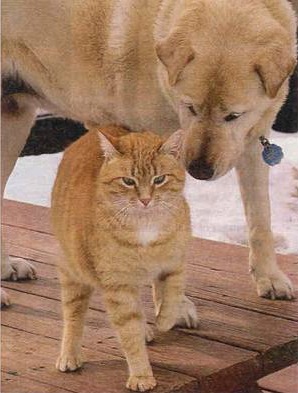 Terry Burns of Middleburg, Pennsylvania tells that Cashew, her blind and deaf Labrador dog-friend, has a seeing-eye cat-friend, seven-year-old Libby. On almost 24-hour duty, Libby steers Cashew away from obstacles and leads her to her food; at night she sleeps next to Cashew. The only time they are apart is when Cashew is taken out for her walk. Clearly, without Libby Cashew would be lost and very lonely.
Terry Burns of Middleburg, Pennsylvania tells that Cashew, her blind and deaf Labrador dog-friend, has a seeing-eye cat-friend, seven-year-old Libby. On almost 24-hour duty, Libby steers Cashew away from obstacles and leads her to her food; at night she sleeps next to Cashew. The only time they are apart is when Cashew is taken out for her walk. Clearly, without Libby Cashew would be lost and very lonely.
--Contributed by Virginia Iris Holmes
Libby is able to see physically on behalf of Cashew because she sees spiritually the Hidden Unity that makes them Friends on the deepest level. How ironic that a supposedly lesser being can perceive and act upon a spiritual reality that some of the "lords of creation" deny when they claim the right to eat their fellow animals . . .
News Notes
Powerful Short Video
Check out this very succinct and effective eleven-minute video giving the grounds for a vegan diet. It speaks to the basic goodness of each person; it has no gory details. www.nonviolenceunited.org:80/veganvideo.html
--Contributed by Steve Kaufman
Foie Gras Back on the Menus
Two years ago, the world of animal defenders celebrated the city of Chicago for banning foie gras in restaurants. But in May, the city council bowed to pressure and rescinded the decree. Torture of the defenseless is back on restaurant plates.
- Contributed by Benjamin Urrutia, Chicago
Spain Blazes a Trail in Rights for Apes
On June 25 the Spanish Parliament passed a bill giving the great apes the rights to freedom from experimentation and abuse. Inspired by the Great Apes Project, the new statute will prohibit using apes in commercials, circuses or filming, but does not prohibit housing them in zoos under specified conditions.
www.reuters.com/article/scienceNews/idUSL256586320080625?feedType=RSS&feedName=scienceNews&rpc=22&sp=true
Recipes
Chickpea- Avocado Salad
Serves 4
3 cups cooked chickpeas, drained
1 ripe tomato, chopped
½ cup Vidalia onion, chopped
1 clove garlic, minced
⅓ cup black olives, pitted and sliced
1 sprig fresh mint, finely chopped (about 2 T.)
handful fresh Genovese basil, finely torn (about ⅓ cup)
4 sprigs fresh parsley, leaves only, chopped (about ⅓ cup)
1 avocado, peeled and cut into chunks
juice of ½ lemon
¼ cup extra virgin olive oil
½ tsp. crushed red pepper flakes
¾ tsp. ground cumin
¾ tsp. sea salt
freshly ground black pepper, to taste
In large salad bowl, whisk together olive oil, lemon juice, cumin, sea salt, crushed pepper flakes, and freshly ground pepper.
Add chickpeas, tomato, onion, garlic, olives, mint, basil and parsley; toss to coat with olive oil mixture. Cover and refrigerate to allow flavor to blend for at least 2 hours.
Just before serving add avocado and toss to combine. Serve over room temperature or cold cooked quinoa and fresh mixed greens. Garnish with fresh mint and basil and lemon wedges.
Frozen Tofu-Berry Cream for Canine Friends
Makes about 2 ½ - 3 cups
I do not recommend raspberries or blackberries due to the high seed content. Peaches or cherries may also be used for a wonderful fruit flavored frozen treat.
1 lb. soft tofu
½ cup fresh or frozen berries (blueberries or strawberries)
2 T. rice or soymilk, vanilla flavor
1 T. evaporated cane juice
2 tsp. vanilla extract
1 tsp. fresh lemon juice
⅛ tsp. sea salt
Place all ingredients in blender or food processor, and process until very smooth. Pour into plastic container with tight fitting lid and freeze. Remove from freezer; allow to soften slightly. Scoop into bowl for your best friend.
--Angela Suarez
My Pilgrimage: Moby (Richard Melville Hall)
Musician and songwriter Moby, 42, has been a vegan for more than 20 years. He is known as a New York City disc jockey and an environmentalist. His names "Melville" and "Moby" stem from a family tradition of descent from novelist Herman Melville.
 Growing up in Connecticut, breakfast [for me] was Frosted Flakes that I would actually put sugar on, lunch was McDonald's, and dinner was usually meat loaf with egg noodles. But as I got older I became more socially and politically aware, and I started trying to reconcile the fact that although I loved animals, I was also eating them. I feel very simply that if you have a choice between one action that causes suffering and one that doesn't you should always try to choose the action that doesn't cause suffering. So I guess when I was around 19, I became a vegetarian; that same logic eventually led me to become a vegan.
Growing up in Connecticut, breakfast [for me] was Frosted Flakes that I would actually put sugar on, lunch was McDonald's, and dinner was usually meat loaf with egg noodles. But as I got older I became more socially and politically aware, and I started trying to reconcile the fact that although I loved animals, I was also eating them. I feel very simply that if you have a choice between one action that causes suffering and one that doesn't you should always try to choose the action that doesn't cause suffering. So I guess when I was around 19, I became a vegetarian; that same logic eventually led me to become a vegan.
When I first went vegan I was very judgmental of people who chose to eat meat. As time passed, I realized that I wasn't necessarily being a good apologist for my beliefs; I was just annoying people. So I've become a lot less militant. I'm still a vegan, but I'm much less likely to judge people who disagree with me. I found what's most effective is actually talking to people rather than trying to be didactic.
When I started touring in the early nineties, being a vegan was very difficult. It's gotten a lot easier. . . . [N]ow almost every decent-size town or city has a health food store or a vegetarian restaurant. The only thing I miss is the convenience airport food. I do travel with my own food, but it's the one time when I really wish I could just put my veganism on hold and go to Sbarro for a piece of pizza.
Politics and social causes are important to me, but whenever I've written music that's carried a strong message, the music has suffered. So instead, I just make music that's personal and subjective.
--From an online interview conducted by Katy Neusteter. Contributed by Lorena Mucke
"Could you look an animal in the eyes and say to [him or her], 'My appetite is more important than your suffering'?" --Moby
Pioneer: Alex Hershaft
 Born into a Jewish family in Warsaw, Poland, in his childhood Alex Hershaft together with his parents was herded by German soldiers into the infamous Warsaw Ghetto, where an estimated 440,000 Jews and some Gypsies were crammed into a small area of the city. Most of them were to die as a result of disease, starvation, and deportation to death camps. Alex's father was among these victims, but shortly before the destruction of the Ghetto in 1943, Alex and his mother Sabina escaped. He hid in rural Poland for the remainder of the war, was reunited with his mother, and lived in a camp for Displaced Persons in Italy. At age 16 Alex came to the United States. Of the period of hiding he says " I know first hand what it's like to be treated like a worthless object, to be hunted by the killers of my family and friends, to wonder each day if I will see the next sunrise . . ."
Born into a Jewish family in Warsaw, Poland, in his childhood Alex Hershaft together with his parents was herded by German soldiers into the infamous Warsaw Ghetto, where an estimated 440,000 Jews and some Gypsies were crammed into a small area of the city. Most of them were to die as a result of disease, starvation, and deportation to death camps. Alex's father was among these victims, but shortly before the destruction of the Ghetto in 1943, Alex and his mother Sabina escaped. He hid in rural Poland for the remainder of the war, was reunited with his mother, and lived in a camp for Displaced Persons in Italy. At age 16 Alex came to the United States. Of the period of hiding he says " I know first hand what it's like to be treated like a worthless object, to be hunted by the killers of my family and friends, to wonder each day if I will see the next sunrise . . ."
This nightmarish childhood had a huge impact on his later involvement in the animal defense movement. He says "In the Warsaw Ghetto, I learned that human beings can treat other human beings like animals. From that, I concluded that the only way to end all oppression is to eliminate the oppression of the most oppressed--nonhuman animals." Elsewhere, he declared that he knew what a veal calf feels like, living in tight confinement in the dark, constantly in terror, because he spent much of his childhood living in a closet to hide from the Nazis.
Alex earned a Ph.D. in chemistry. Before becoming an animal activist he worked in teaching, research, and environmental management for various organizations. He is father of a daughter, Monica.
In 1962 or 1963 he became a vegetarian, but his real coming-out was at the International Vegetarian Union (IVU) conference at Orano, Maine in 1975, where he made contact with many others in the movement. He founded several organizations on behalf of both humans and animals, the most important one being the abolitionist Farm Animals Reform Movement (FARM). Some of the programs it has sparked are the Great American Meatout (March 20), World Farm Animals Day (October 2, Gandhi's birthday), the National Veal Ban Campaign (Mother's Day) and CHOICE, which promotes vegetarian options in school cafeterias. FARM also sponsors yearly animal rights conferences, and created the Sabina fund which offers grants to small grassroots groups to promote veganism.
In his review of Gail Eisnitz's book Slaughterhouse, Alex wrote "In the midst of our high-tech, ostentatious, hedonistic lifestyle, among the dazzling monuments to history, art, religion, and commerce, there are the 'black boxes.' These are the biomedical research laboratories, factory farms, and slaughterhouses--faceless compounds where society conducts its dirty business of abusing and killing innocent, feeling beings. These are our Dachaus, our Buchenwalds, our Birkenaus. Like the good German burghers, we have a fair idea of what goes on there, but we don't want any reality checks."
--Gracia Fay Ellwood.
Derived from The Eternal Treblinka by Charles Patterson, The Longest Struggle by Norm Phelps, and the IVU website.
Poetry: Nostalgia
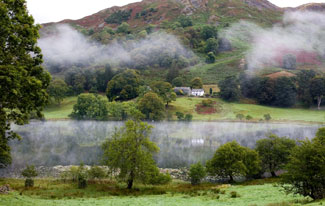 All my life, I have been bothered
All my life, I have been bothered
By nostalgia for things I never knew:
Smell of hay, dusty barns, dewy nights,
Misty daybreaks, grassy meadows
These never belonged to me:
They belong to cattle--
And I have eaten a lot of cattle.
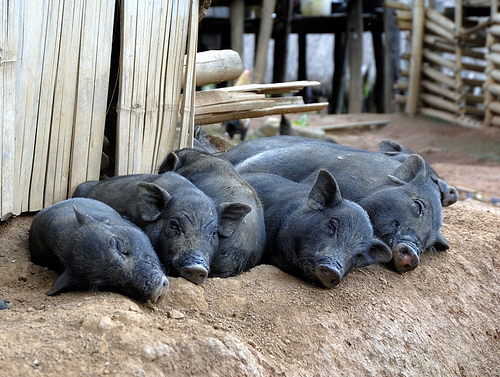 Faint memory stirs of sleeping securely
Faint memory stirs of sleeping securely
Against many other bodies,
Our warmth hovering between us
And the fresh, cool night air.
Soil was fragrant under us,
Our heartbeats and breaths unified.
Clearly, it's the pigs I have eaten
Remembering their lost lives.
And the compulsion to duty?
Maybe that comes from the "fryers,"
Hundreds of them, denied
The daily eggs they'd planned.
Or from worn-out dairy goats
Shipped to slaughter
With their failing milk undrawn.
Such bothersome nostalgia.
--Joan Gilbert
Hallsville, Missouri
Poem reprinted with author's permission from The Friendly Vegetarian, Winter 1993-94.
Credits:
The Peaceable Table is
intended to resume the witness of that excellent vehicle of the Friends
Vegetarian Society of North America, The Friendly
Vegetarian, which appeared quarterly between 1982 and
1995. Following its example, and sometimes borrowing from its
treasures, we publish articles for toe-in-the-water
vegetarians as well as long-term ones, poetry, letters, book
and film reviews, and recipes.
The journal is intended to be
interactive; contributions, including illustrations, are
invited for the next issue. Deadline for the September issue
will be August 29, 2008. Send to graciafay@mac.com
or 10 Krotona Hill, Ojai, CA 93023. We operate primarily
online in order to save trees and labor, but hard copy
is available for interested persons who are not online.
The latter are asked to donate $12 (USD) per year if their means allow. Other
donations to offset the cost of the domain name, server, and
advertising notices are welcome.
Website www.vegetarianfriends.net
Editor: Gracia Fay Ellwood
Book and Film Reviewers: Benjamin Urrutia & Robert Ellwood
Recipe Editor: Angela Suarez
NewsNotes Contributors: Marian Hussenbux & Lorena Mucke
Technical Architect: Richard Scott Lancelot Ellwood


 Terry Burns of Middleburg, Pennsylvania tells that Cashew, her blind and deaf Labrador dog-friend, has a seeing-eye cat-friend, seven-year-old Libby. On almost 24-hour duty, Libby steers Cashew away from obstacles and leads her to her food; at night she sleeps next to Cashew. The only time they are apart is when Cashew is taken out for her walk. Clearly, without Libby Cashew would be lost and very lonely.
Terry Burns of Middleburg, Pennsylvania tells that Cashew, her blind and deaf Labrador dog-friend, has a seeing-eye cat-friend, seven-year-old Libby. On almost 24-hour duty, Libby steers Cashew away from obstacles and leads her to her food; at night she sleeps next to Cashew. The only time they are apart is when Cashew is taken out for her walk. Clearly, without Libby Cashew would be lost and very lonely. 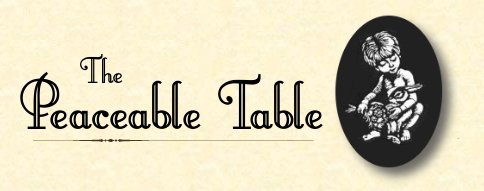
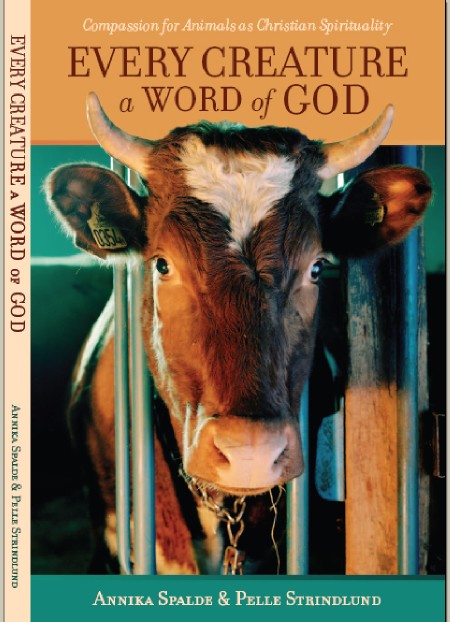 This new book is an unusual work in several respects. The two authors are a married couple, both workers in the (Lutheran) Church of Sweden, though very ecumenical in spirit. They are out-front activists in animal and disarmament issues, having been arrested and done prison time for their efforts in Britain as well as their native Sweden; the book contains running narratives of their civil-disobedience endeavors to liberate laboratory and factory farm animals. The two compare these labors with those of abolitionists opposing slavery, and note that they always leave their names as well as an explanatory letter with the "owners" of the liberated animals, thus inviting arrest if that is the proprietors' desire.
This new book is an unusual work in several respects. The two authors are a married couple, both workers in the (Lutheran) Church of Sweden, though very ecumenical in spirit. They are out-front activists in animal and disarmament issues, having been arrested and done prison time for their efforts in Britain as well as their native Sweden; the book contains running narratives of their civil-disobedience endeavors to liberate laboratory and factory farm animals. The two compare these labors with those of abolitionists opposing slavery, and note that they always leave their names as well as an explanatory letter with the "owners" of the liberated animals, thus inviting arrest if that is the proprietors' desire.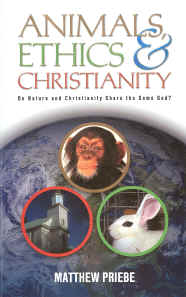 Mr. Priebe, who is obviously no self-promoter, gives away very little information about himself on these pages. On the internet I managed to learn that he considers himself a self-taught student of animal behavior, and that he travels North America to observe animals in their natural environments. According to the book's dedication, he was accompanied in these educational field trips by Blackie and Spot, feline sisters who were his best friends. On page 16 we learn that his grandfather had a farm , and how Grandpa cured some chickens of the vice of eating their own eggs.
Mr. Priebe, who is obviously no self-promoter, gives away very little information about himself on these pages. On the internet I managed to learn that he considers himself a self-taught student of animal behavior, and that he travels North America to observe animals in their natural environments. According to the book's dedication, he was accompanied in these educational field trips by Blackie and Spot, feline sisters who were his best friends. On page 16 we learn that his grandfather had a farm , and how Grandpa cured some chickens of the vice of eating their own eggs. Growing up in Connecticut, breakfast [for me] was Frosted Flakes that I would actually put sugar on, lunch was McDonald's, and dinner was usually meat loaf with egg noodles. But as I got older I became more socially and politically aware, and I started trying to reconcile the fact that although I loved animals, I was also eating them. I feel very simply that if you have a choice between one action that causes suffering and one that doesn't you should always try to choose the action that doesn't cause suffering. So I guess when I was around 19, I became a vegetarian; that same logic eventually led me to become a vegan.
Growing up in Connecticut, breakfast [for me] was Frosted Flakes that I would actually put sugar on, lunch was McDonald's, and dinner was usually meat loaf with egg noodles. But as I got older I became more socially and politically aware, and I started trying to reconcile the fact that although I loved animals, I was also eating them. I feel very simply that if you have a choice between one action that causes suffering and one that doesn't you should always try to choose the action that doesn't cause suffering. So I guess when I was around 19, I became a vegetarian; that same logic eventually led me to become a vegan. Born into a Jewish family in Warsaw, Poland, in his childhood Alex Hershaft together with his parents was herded by German soldiers into the infamous Warsaw Ghetto, where an estimated 440,000 Jews and some Gypsies were crammed into a small area of the city. Most of them were to die as a result of disease, starvation, and deportation to death camps. Alex's father was among these victims, but shortly before the destruction of the Ghetto in 1943, Alex and his mother Sabina escaped. He hid in rural Poland for the remainder of the war, was reunited with his mother, and lived in a camp for Displaced Persons in Italy. At age 16 Alex came to the United States. Of the period of hiding he says " I know first hand what it's like to be treated like a worthless object, to be hunted by the killers of my family and friends, to wonder each day if I will see the next sunrise . . ."
Born into a Jewish family in Warsaw, Poland, in his childhood Alex Hershaft together with his parents was herded by German soldiers into the infamous Warsaw Ghetto, where an estimated 440,000 Jews and some Gypsies were crammed into a small area of the city. Most of them were to die as a result of disease, starvation, and deportation to death camps. Alex's father was among these victims, but shortly before the destruction of the Ghetto in 1943, Alex and his mother Sabina escaped. He hid in rural Poland for the remainder of the war, was reunited with his mother, and lived in a camp for Displaced Persons in Italy. At age 16 Alex came to the United States. Of the period of hiding he says " I know first hand what it's like to be treated like a worthless object, to be hunted by the killers of my family and friends, to wonder each day if I will see the next sunrise . . ."  All my life, I have been bothered
All my life, I have been bothered Faint memory stirs of sleeping securely
Faint memory stirs of sleeping securely